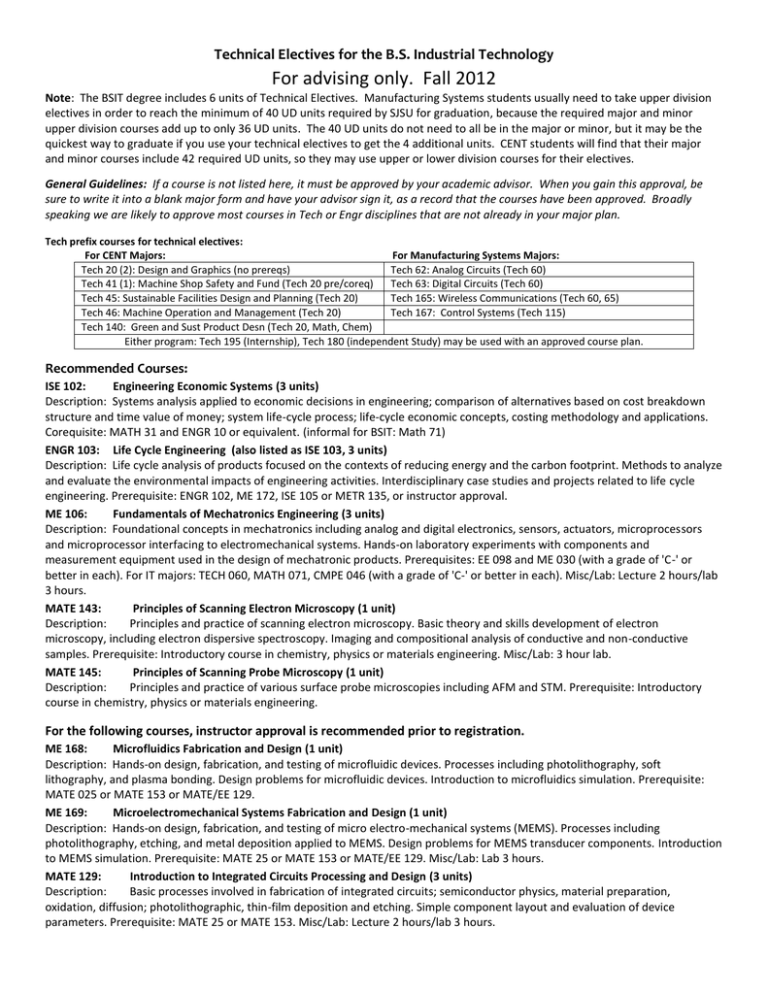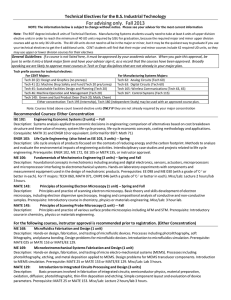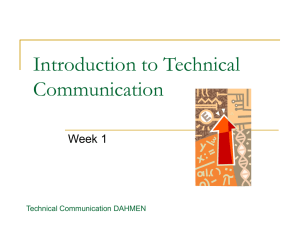Technical_Electives_..
advertisement

Technical Electives for the B.S. Industrial Technology For advising only. Fall 2012 Note: The BSIT degree includes 6 units of Technical Electives. Manufacturing Systems students usually need to take upper division electives in order to reach the minimum of 40 UD units required by SJSU for graduation, because the required major and minor upper division courses add up to only 36 UD units. The 40 UD units do not need to all be in the major or minor, but it may be the quickest way to graduate if you use your technical electives to get the 4 additional units. CENT students will find that their major and minor courses include 42 required UD units, so they may use upper or lower division courses for their electives. General Guidelines: If a course is not listed here, it must be approved by your academic advisor. When you gain this approval, be sure to write it into a blank major form and have your advisor sign it, as a record that the courses have been approved. Broadly speaking we are likely to approve most courses in Tech or Engr disciplines that are not already in your major plan. Tech prefix courses for technical electives: For CENT Majors: For Manufacturing Systems Majors: Tech 20 (2): Design and Graphics (no prereqs) Tech 62: Analog Circuits (Tech 60) Tech 41 (1): Machine Shop Safety and Fund (Tech 20 pre/coreq) Tech 63: Digital Circuits (Tech 60) Tech 45: Sustainable Facilities Design and Planning (Tech 20) Tech 165: Wireless Communications (Tech 60, 65) Tech 46: Machine Operation and Management (Tech 20) Tech 167: Control Systems (Tech 115) Tech 140: Green and Sust Product Desn (Tech 20, Math, Chem) Either program: Tech 195 (Internship), Tech 180 (independent Study) may be used with an approved course plan. Recommended Courses: ISE 102: Engineering Economic Systems (3 units) Description: Systems analysis applied to economic decisions in engineering; comparison of alternatives based on cost breakdown structure and time value of money; system life-cycle process; life-cycle economic concepts, costing methodology and applications. Corequisite: MATH 31 and ENGR 10 or equivalent. (informal for BSIT: Math 71) ENGR 103: Life Cycle Engineering (also listed as ISE 103, 3 units) Description: Life cycle analysis of products focused on the contexts of reducing energy and the carbon footprint. Methods to analyze and evaluate the environmental impacts of engineering activities. Interdisciplinary case studies and projects related to life cycle engineering. Prerequisite: ENGR 102, ME 172, ISE 105 or METR 135, or instructor approval. ME 106: Fundamentals of Mechatronics Engineering (3 units) Description: Foundational concepts in mechatronics including analog and digital electronics, sensors, actuators, microprocessors and microprocessor interfacing to electromechanical systems. Hands-on laboratory experiments with components and measurement equipment used in the design of mechatronic products. Prerequisites: EE 098 and ME 030 (with a grade of 'C-' or better in each). For IT majors: TECH 060, MATH 071, CMPE 046 (with a grade of 'C-' or better in each). Misc/Lab: Lecture 2 hours/lab 3 hours. MATE 143: Principles of Scanning Electron Microscopy (1 unit) Description: Principles and practice of scanning electron microscopy. Basic theory and skills development of electron microscopy, including electron dispersive spectroscopy. Imaging and compositional analysis of conductive and non-conductive samples. Prerequisite: Introductory course in chemistry, physics or materials engineering. Misc/Lab: 3 hour lab. MATE 145: Principles of Scanning Probe Microscopy (1 unit) Description: Principles and practice of various surface probe microscopies including AFM and STM. Prerequisite: Introductory course in chemistry, physics or materials engineering. For the following courses, instructor approval is recommended prior to registration. ME 168: Microfluidics Fabrication and Design (1 unit) Description: Hands-on design, fabrication, and testing of microfluidic devices. Processes including photolithography, soft lithography, and plasma bonding. Design problems for microfluidic devices. Introduction to microfluidics simulation. Prerequisite: MATE 025 or MATE 153 or MATE/EE 129. ME 169: Microelectromechanical Systems Fabrication and Design (1 unit) Description: Hands-on design, fabrication, and testing of micro electro-mechanical systems (MEMS). Processes including photolithography, etching, and metal deposition applied to MEMS. Design problems for MEMS transducer components. Introduction to MEMS simulation. Prerequisite: MATE 25 or MATE 153 or MATE/EE 129. Misc/Lab: Lab 3 hours. MATE 129: Introduction to Integrated Circuits Processing and Design (3 units) Description: Basic processes involved in fabrication of integrated circuits; semiconductor physics, material preparation, oxidation, diffusion; photolithographic, thin-film deposition and etching. Simple component layout and evaluation of device parameters. Prerequisite: MATE 25 or MATE 153. Misc/Lab: Lecture 2 hours/lab 3 hours.





